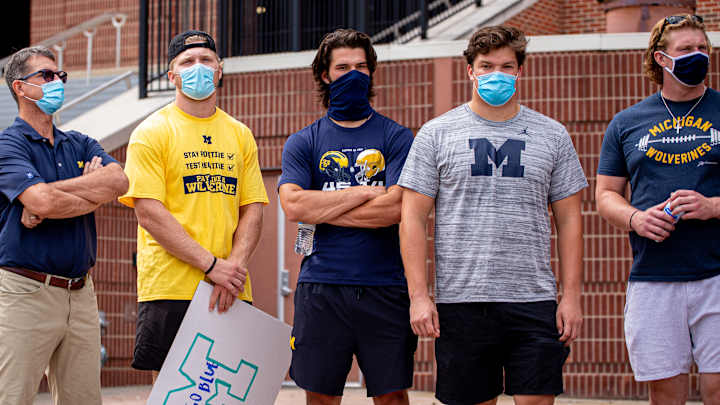Big Ten Football's Return: An Example Of Teamwork Or Advanced Safety Revelations?

For the Big Ten to move from postponing the 2020 fall football season to reinstating said season less than two months later, many separate individuals, groups and entities has to work in collaboration to pull this off. School presidents were required to work in tandem with athletic directors, football players had to take health and safety instruction from their coaches and other concerned onlookers chipped in with help whenever necessary.
But is the fact that the Big Ten season has returned more a product of that cohesion or an example that more medical information is available? The latter is what the Big Ten claimed during its press conference earlier today.
"We will take a leadership role. We will put the health and safety of our student athletes first and foremost, and I'm proud to sit here and say that we did that," Big Ten Commissioner Kevin Warren said. "We are so much better, so much more prepared today than we were 43 days ago."
Warren continued to champion the work of administrators from across the conference as pivotal in the Big Ten's decision to reverse the season's postponement and others on the call echoed that sentiment.
"For me, it wasn't about political pressure, it wasn't about lawsuits or what everyone else was doing," Northwestern President Morton Schapiro said on Wednesday. "It was the unanimous opinion of our medical experts, and that sort of evolved over the course of weeks. Even a week ago, I wasn't convinced to be part of the unanimous decision to move forward
"For me, the turning point was a long conversation with our medical team on Saturday with a subset of the presidents and chancellors and then again on Sunday and then again it culminated late last night," Schapiro said. "The turning point for me was just that, as I said before. I am not a physician, and when the medical team was divided as much as they were five weeks ago-- some were convinced, I wasn't, as you know from the vote.
"But then it turned around over the course of the past week, I would say. Once we got the testing arrangements set and figured out how to do it safely, that's how we move forward."
While it is indisputable that the Big Ten has a better handle on playing during the COVID-19 era than it did before, perhaps the conference's sudden course reversal is more representative of the grassroots efforts taking place at each of the 14 schools in favor of playing football.
Last month, Michigan head coach Jim Harbaugh penned a clear and concise letter on why he believes that the Big Ten should play football this fall. Harbaugh outlined the specifics on how Michigan is succeeding at its COVID-19 containment on campus while also covering the benefits that college athletes will enjoy from playing the 2020 season. In all, Harbaugh's thesis showed that is is all in on playing football this year.
After that, Michigan football held a protest outside Michigan Stadium earlier this month with parents and fans in attendance to express their mutual desire for the team to play this year. During the protest, U-M quarterback Dylan McCaffrey explained in clear detail how the team had already been executing best safety practices before the season was postponed.
"We had, I think it was three full team tests in a row, zero cases," McCaffrey said. "We were doing everything like you're supposed to do then your season got stripped for us right at a time where things were looking really up for us, up for us as a program, up for players in general. We are here to almost vent and hopefully something changes in the process.”
Prior to the #LetThemPlay protest in Ann Arbor, a contingent of Big Ten players' parents drove to Big Ten headquarters in Illinois to express their feelings on the matter too, representing a throng of players in the process. This helped put additional pressure on the Big Ten community as countless groups have questioned the Big Ten's decision-making and called for course correction.
One of the most vocal advocates in that corner is former Ohio State linebacker and ESPN correspondent Bobby Carpenter. After appearing on a slew of television shows and radio spots, Carpenter worked to rally the troops on Twitter and encouraged people to contact, write and leave messages for Big Ten presidents and athletic directors. Through that process, Carpenter reached across the aisle to former Michigan players and politely pushed for those former Wolverines to use their clout and position within the program to influence the athletic department at U-M.
I think @CoachJim4UM now has an understanding that the @UMich President is holding everything up.
— Bobby Carpenter (@Bcarp3) September 9, 2020
It would be great for some current players and @TomBrady@CharlesWoodson @briangriese @JakeLong77 @JabrillPeppers to join the cause about what their last year at UM meant https://t.co/a1nVpt8sAi
In all, Carpenter's teamwork-based approach towards changing the Big Ten's decision is representative of how effective a strong, pointed collective effort can be. Though Ohio State and Michigan fans and parents rarely see eye-to-eye, the two groups fought together for the players on each roster to have a chance at playing this season. Those surrounding the two programs listened to what players were actually saying, and all that they asked is that those in power to make important decisions would do the same.
The Big Ten's football community spoke, and the administrators listened.
Football is back in 2020.
What do you think about the Big Ten's decision to backtrack on postponing the 2020 football season? Do you think that's an example of teamwork or just how much ground the Big Ten has covered in the last month or so? Let us know!
